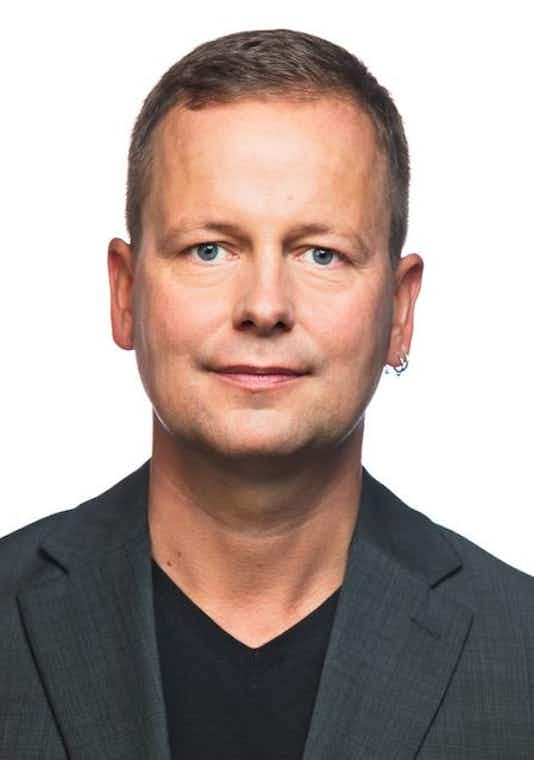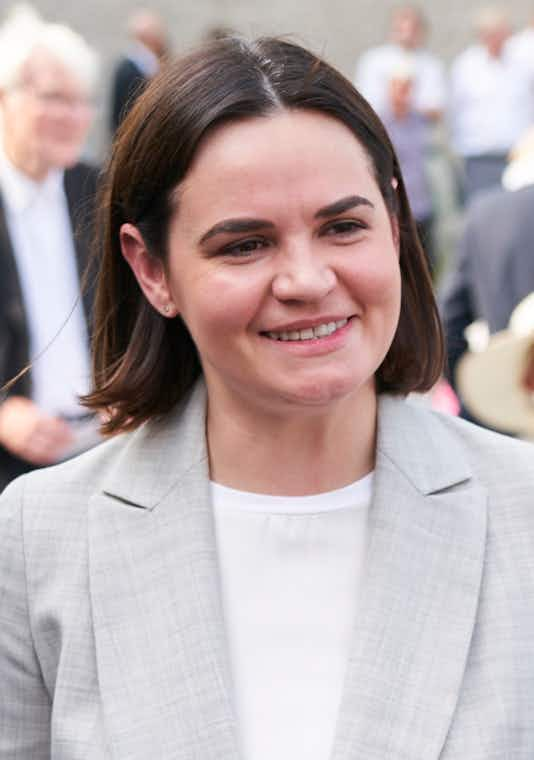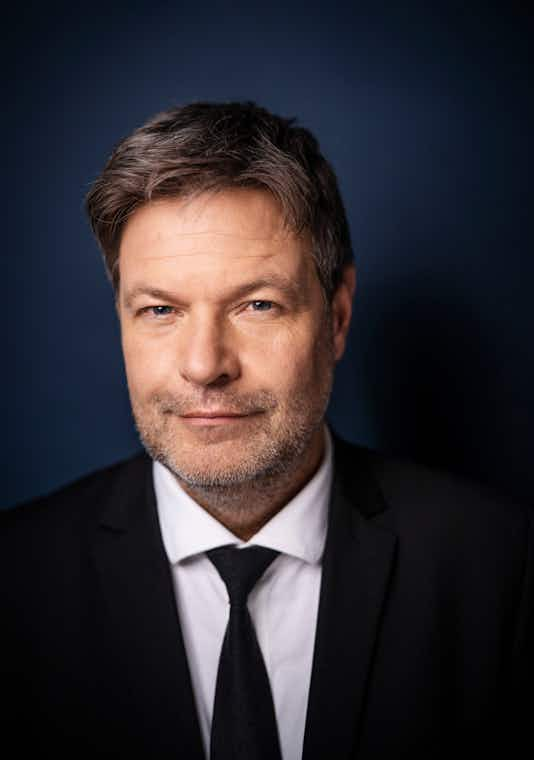Ansprache Feierstunde (engl.)
Ansprache
Feierstunde der Bundesregierung und der Stiftung 20. Juli 1944 am 20. Juli 2022 um 15:00 Uhr in der Gedenkstätte Plötzensee, Berlin, anlässlich des 78. Jahrestages des 20. Juli 1944
- Swetlana Tichanowskaja -
Dear excellencies,
President of the German Bundestag,
President of the Bundesrat,
Minister Lambrecht,
Mayor Lederer,
Members of the German Bundestag and state parliaments,
Professor von Steinau-Steinrück,
Families of the men and women involved in the July Plot,
Friends,
Thank you for your kind introduction.
Standing here today, I feel the weight of history. It is nauseating to think that only a couple of steps from where I stand now, nearly three thousand people were executed.
Walking through the prison today, I felt so small. My heart began to beat faster. I thought that my husband Sergei must have felt something similar when he first entered the courtyard of Zhodino prison.
This nausea must be the feeling of bravery. The taste of consciously facing danger. Of walking into the prison yard with eyes open and head high.
This is what courage feels like.
As some of you mentioned, people here today come from a free society. That was not always the case, as this place reminds us. Yesterday, at the Bender Block museum, I was inspired by many stories of Germans who defied Nazis.
I, however, come from an unfree society. In my country, there are 1,254 recognized political prisoners – that's more than 130 per million. Right now, more than 5000 are being prosecuted for politically-motivated crimes.
Political prisoners are isolated from others. Sergei has spent two years now in solitary confinement. As I speak, he is in a punishment cell. He has no personal belongings–he cannot read books or write letters. His bed is a piece of metal with a wooden surface. He has no mattress nor bed linen. Although his cell is cold at night, he is only allowed one set of summer clothes. He can't speak to us today, but I am sure he would say that courage for him feels like the suffocating air of his punishment cell.
But Belarusians outside the prisons are also isolated from each other. They are isolated by fear of persecution for how they think, talk, and dress. The whole country is under surveillance. Some try to flee this police-state – through forests and swamps – but if they are caught they face tortures.
So today, I am here to speak on behalf of the silenced. On behalf of Sergei, on behalf of Marya Kalesnikava. On behalf of 18-year-old Pavel Piskun, who this week received three years in prison for sharing photos of Russian troops with Telegram channels. I am here to speak on behalf of thousands suffering for their courage, and thousands more who are paralyzed by fear. I have lived under tyranny, and I know how it can rob you of your voice.
In the 1940s, the German resistance protected their humanity in the face of great evil. Yes, this evil had much larger dimensions than what Belarusians face today. However, the bravery that Belarusians are showing in fighting it is no less inspiring. Civil courage is timeless – and knows no boundaries.
The history of German resistance tells us that small acts of courage by few can pave the way to freedom and peace for all.
During the Second World War, the German resistance waged a secret war against the Nazis. It was not an organized mass movement. It was the sum of thousands of small acts of humanity by individual Germans. The coup attempt of July 20th may be the best-known example of the resistance. But to me, the smaller, quieter acts of bravery were no less courageous.
Members of German resistance came from all walks of life. They were workers, students, teachers, and priests. They were intellectuals and artists. Some of them were military officers. I want to share one of the stories.
I was inspired by the story of Elisabeth von Thadden. Born in East Prussia, Elisabeth established a school for girls. The school taught both Christian and Jewish girls: even after the Nazis came to power, Elisabeth continued to enroll Jewish girls alongside her Christian students. When her school was shut down, she supported Jewish families: she collected food stamps and helped Jewish families escape by night. She risked her life to save others – each food-stamp she shared had her name on it: each one meant a short relief for a Jewish family, each one carried a big risk for Elisabeth, each one was an act of courage. On July 1st, 1944, Elisabeth was sentenced to death for conspiring to commit high treason.
She sacrificed everything to stay human in defiance of a terrible regime. Her story is one of humanity and courage.
Today, the Belarusian fight for freedom is also defined by small acts of humanity and courage.
I remember my first visit to Berlin in October 2020. I felt that my country was on the brink of freedom: hundreds of thousands were taking to the streets every weekend. Men, women, students, workers, grandparents, even children protested the stolen elections and demanded their rights. Trade unions were planning strikes. Women held their own marches. Security officials were quitting government positions. We all felt the regime was about to collapse.
We hoped to get Belarusians out of prisons but instead our whole country became a prison. Our fight has proven to be longer. Those same men and women have gone underground. But still: every week, we hear of small acts of defiance. Graffiti on a public building, the appearance of the white-red-white flag, a "stop the war" symbol on a street sign. Those are all small acts of courage in the times when bigger demonstrations have simply become too dangerous to call for.
The regime became more repressive than ever before. Just two months ago, illegitimate Lukashenka signed a law permitting those accused of an "attempted terrorist act" to be executed. The regime also keeps a list of the so-called terrorists. It grows longer by the day. Now, it includes 870 names. Marya Kalesnikava, my husband and myself are on the list.
Germany, you awarded us the Karlspreis! The regime awards us with a death threat.
Two weeks ago, another person joined Marya and myself on this list. Her name is Danuta, and she is only 20 years old. A bright and hardworking student, Danuta posted a message condemning the war and calling for peaceful protest. She was sentenced to 6.5 years in prison.
Nonetheless, Belarusians don’t give up.
Since the outbreak of the war against Ukraine, Belarusians continue to stand up for what they know is right. 85 percent – the vast majority – opposes Belarusian military involvement in the war. Belarusians have distributed over 500,000 anti-war pamphlets. They have donated more than 40 cars, thousands of bullet-proof vests, medical supplies and toiletries to our volunteers on the front. Belarus is not as rich as Germany. But people with caring hearts always find something to give.
I am inspired by the Belarusian partisans who have sabotaged the Russian army. They have hacked the regime's websites, and they defiantly committed acts of sabotage on the railways. They have done everything they can to delay the supply of weapons. None of these acts of defiance have been violent, but the police still shot three partisans in the knees when they were caught. And now, for their courage, they might be sentenced to capital punishment.
I am inspired by the hundreds of Belarusian volunteers who are defending Ukraine with their lives. We have up to 1500 Belarusian volunteers in the Ukrainian army. They are making unimaginable sacrifices. On June 26th, the HERO of the Belarusian Kalinouski Regiment, Brest, was killed in action. He was covering his Ukrainian and Belarusian brothers in arms. He stood up and was killed instantly by an enemy bullet.. Days ago, the regime's media published a map with names and homes of his and other volunteers' relatives to harass them. Even after death, KGB doesn't stop hunting his relatives and other families to take revenge.
I am inspired by the ordinary Belarusians who show their solidarity with Ukraine. In total, more than 2100 people have been detained or jailed for acts of defiance.
One of them is the 60-year-old Alla Korolenko. Alla wanted to help children too. In June, she decided to organize a “Birthday” for kids of Ukrainian refugees. They would have held a party and bring toys and presents for Ukrainian children. However, the authorities decided that the party was an “illegal action.” They dispersed the “Birthday” and detained Alla. Another brave Belarusian is Irina Kapilova. Back in February, Irina tied blue and yellow ribbons to her car to show solidarity with Ukraine. Irina was summoned to the police station a few months later, where the officer put her in a cell on trumped-up charges. She was detained for nearly a month before Belarusian authorities deported her to Lithuania.
Alla and Irina’s stories remind us of the risks of courage. But despite these risks, Belarusian men and women continue to struggle for freedom for themselves and for Ukraine. Just days ago, a union of Belarusian mothers launched a flashmob to protest the war. They took their children's toys and placed them throughout the streets of Belarus. The toy animals held little signs “We Don’t Support This War!” These mothers carried out their flashmob facing the risk of arrest.
Belarusians and Germans know that every act of courage, however small or secret, makes a difference. Each act of courage is a small step towards freedom. So when we are millions, we can walk a long way.
I am happy to say that we are not walking this path alone. I am grateful for the help that Germany provided. You refused to recognize the illegitimate regime. You imposed targeted sanctions on his cronies. You welcomed Belarusian political refugees into your country. I remember my first conversation with chancellor Angela Merkel. She patiently listened to me, and then gave me advice I won't forget: she urged me to be patient but never lose confidence in what we do. I remember her voice full of empathy and understanding, as she shared my pain.
We never lost confidence in our fight. And we have learned a lot in the past few years.
First, dictatorships thrive when democracies don’t pay attention. Europeans woke up to: "We have a war in Europe!" because they slept through: "We have dictatorship in Europe!". I hope it's clear by now that peace for Ukraine and Europe is only possible if Belarus is free from dictatorship. And vice versa: there can be no freedom for Belarus without freedom for Ukraine. There can be no security for Ukraine with a Putin-backed dictator next door. And there can be no peace for Europe without peace in Ukraine. We're all part of a global fight against authoritarianism. And we only win when we stay united and focused.
Second, dictators cannot be appeased or re-educated. We know how appeasement attempts ended in 1938. We warned the free world not to repeat the same mistakes with Putin or Lukashenka. Dictators know that democracies prefer an unstable peace to a consistent fight. It took European democracies months to show they also have teeth.
Third, and most importantly, real change is the product of millions of small acts of courage. Belarusians demonstrated the power of civil courage in the face of authoritarianism. Right now, to help Ukraine and Belarus achieve freedom and protect yours, the courage of many is not enough–we need courage from all. From an ordinary German to the chancellor, it takes courage to care. For politicians, it takes courage to act on your beliefs when the media are disinterested. For a regular person, it takes courage to write a letter to a political prisoner, to pay a higher gas bill, to take on responsibility for those who seem so far away.
Thankfully we have examples in history to inspire and guide us. Today is precisely about celebrating them.
I admire how Germans cherish their history, their freedom, and their true heroes.
I would like to finish with one final story that stuck with me from yesterday. This story touched me deeply as a mother. Liane Berkowitz was a young German resistance fighter who was arrested in late 1942. Liane was sentenced to death, but she was pregnant with a little girl. She gave birth to her daughter in custody; the child was given to her grandmother before she was transferred to Plotzensee. There, the young mother was executed only two days before her 20th birthday.
Despite terror and fear, heroes like Berkowitz found bravery to rise against the tyranny. Just before she died, Liane wrote her mother a letter. She said she “did not fear death.” Liane found peace in her love for her daughter. She found peace in the faith that her daughter would live in a better world. She was inspired to act courageously by the possibility of ensuring a peaceful future for her child.
My personal struggle is also about my children. I am inspired by my 12-year-old son's daily acts of courage. Every time his 6-year-old sister asks where her daddy is, her brother says: "on a work trip". He knows his father is in prison. But he protects his sister.
I hope that my children won't have to perform such acts of courage in the future. I hope for them courage will not taste like the suffocating air of a prison cell or remind them of the nauseous feeling of walking through a prison's courtyard. Instead, courage for them should be about excitement and challenge. I hope their small acts of courage will be about building a better future for themselves and generations to come.
But for that, we must remember the past.
Dank euch allen!
Weitere Reden




